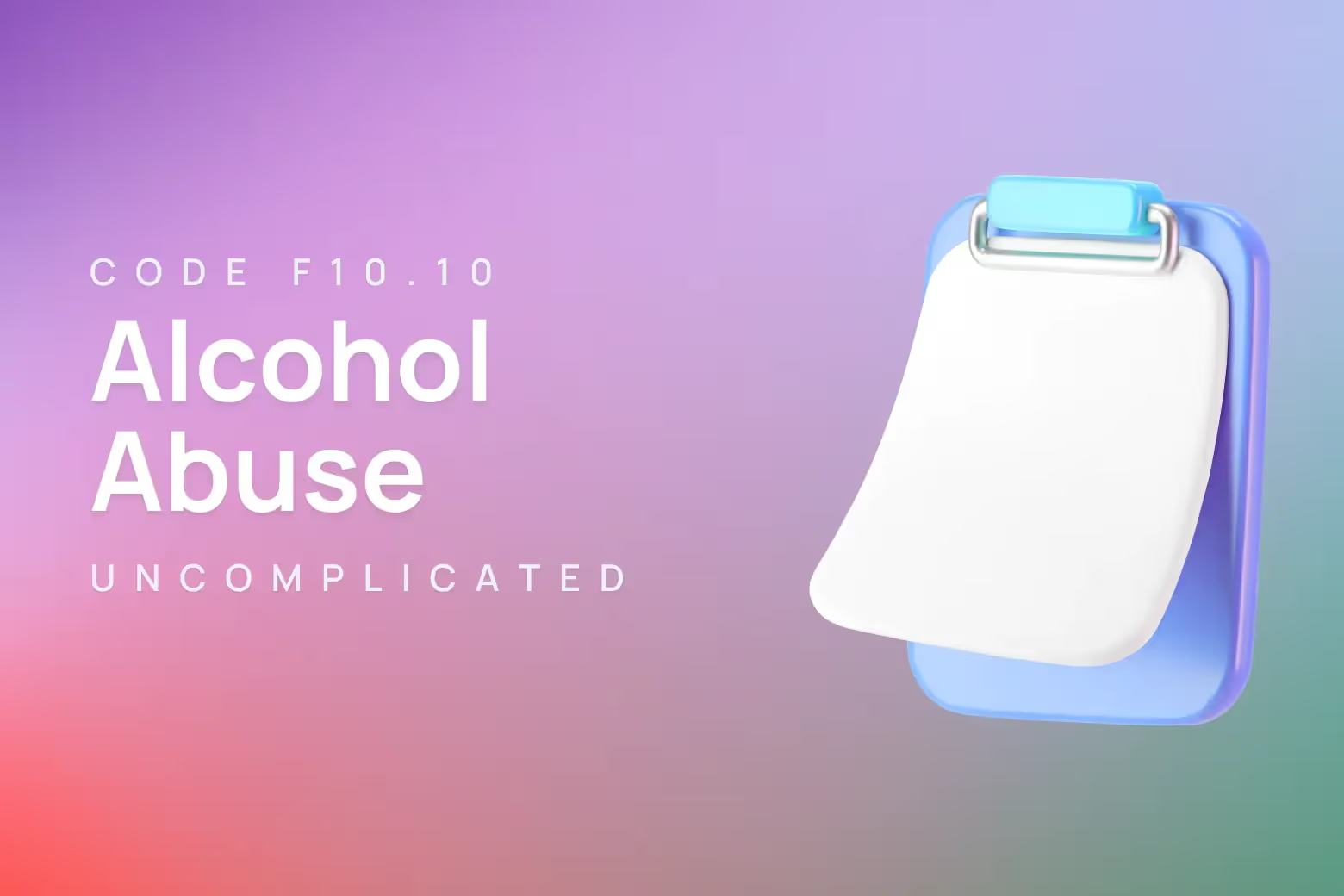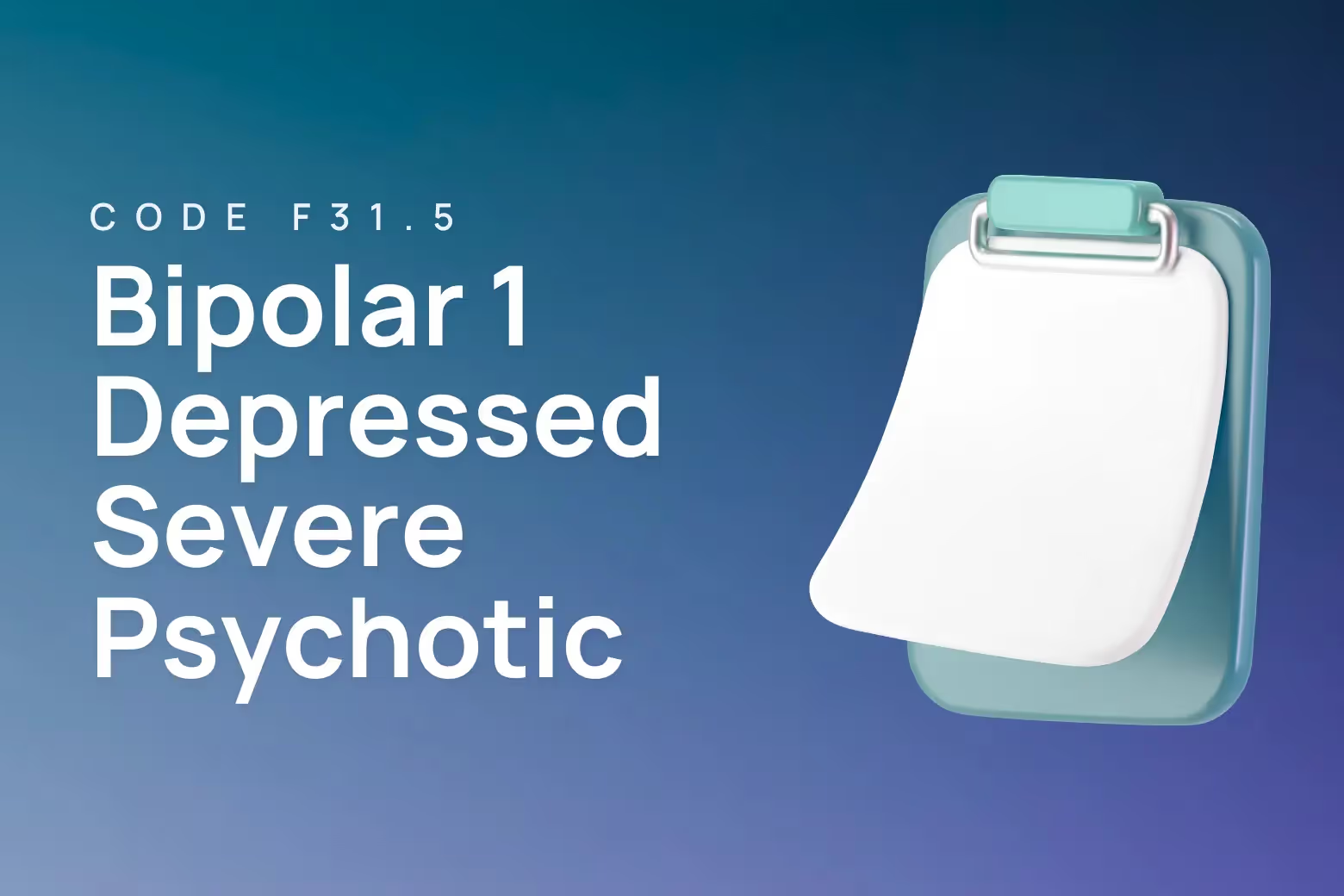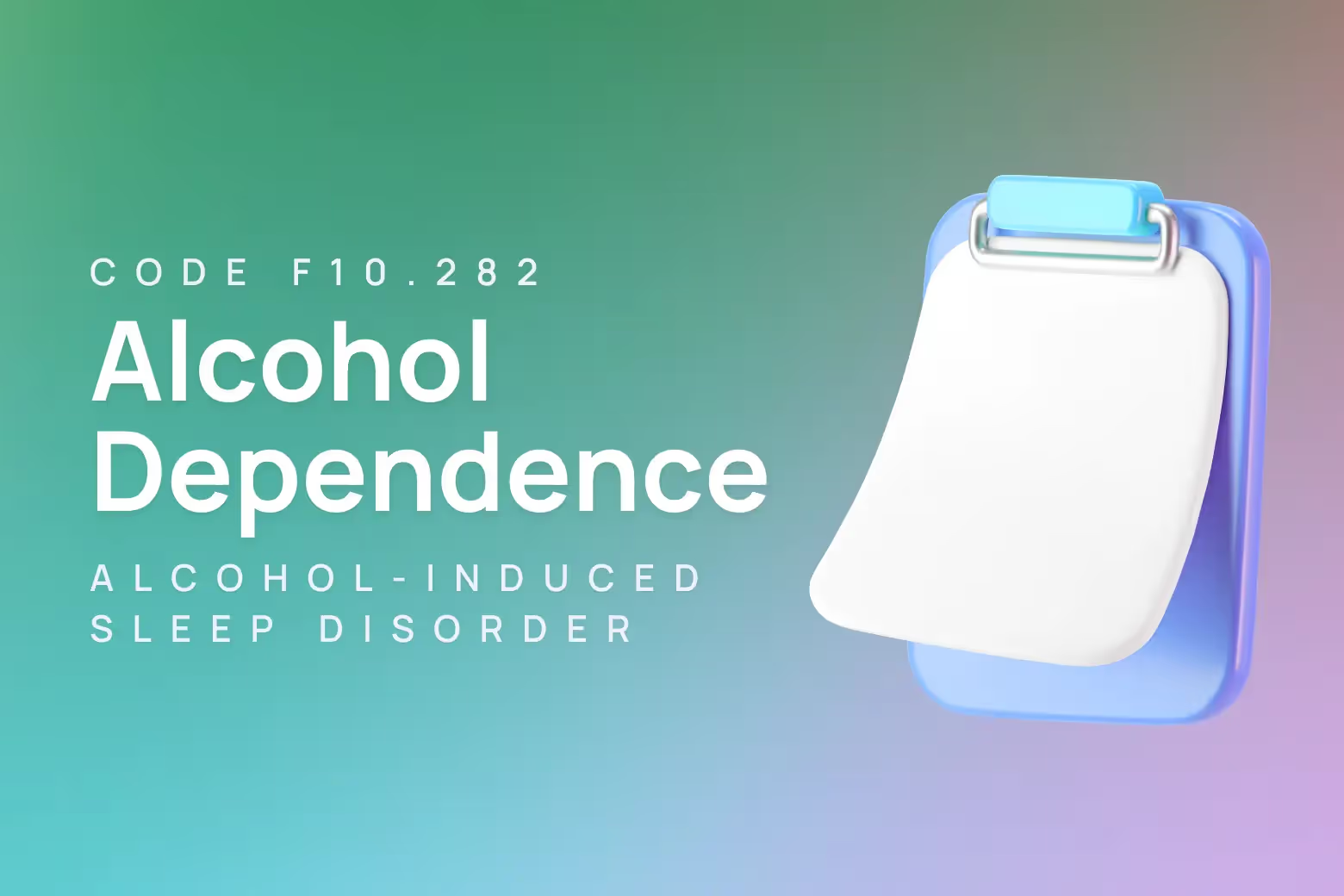ICD-10 code for alcohol abuse, uncomplicated

F10.10 is the ICD-10 code for alcohol abuse, uncomplicated.
This diagnostic code identifies individuals who meet criteria for mild alcohol use disorder without complications or withdrawal symptoms.
Accurate diagnostic coding helps clinicians provide appropriate treatment interventions and proper billing documentation.
Key features:
- F10.10 ICD-10 code represents mild alcohol use disorder with 2-3 diagnostic criteria present
- Used when no complications like intoxication or withdrawal are present
- Requires 12-month period of problematic alcohol use patterns
- Distinguished from more severe alcohol use disorders and remission states

Diagnostic criteria for alcohol abuse, uncomplicated (F10.10)
F10.10 applies to cases meeting mild alcohol use disorder criteria without additional complications.
The diagnosis requires evidence of clinically significant impairment from alcohol use patterns over at least 12 months.
Clinical assessment focuses on identifying problematic alcohol consumption behaviors that interfere with daily functioning.
The severity classification depends on the total number of criteria met during the assessment period.
Specific diagnostic requirements include:
- Presence of exactly 2-3 symptoms from the alcohol use disorder criteria checklist
- Alcohol consumption in larger amounts or longer periods than intended
- Persistent desire or repeated unsuccessful attempts to reduce alcohol use
- Significant time spent obtaining, using, or recovering from alcohol effects
- Strong urges or cravings to use alcohol
- Recurrent alcohol use causing failure to meet work, school, or home obligations
- Continued use despite persistent interpersonal problems caused by alcohol
- Reduced important activities due to alcohol use priorities
- Repeated alcohol use in physically hazardous situations
- Continued use despite awareness of alcohol-related physical or psychological problems
- Evidence of tolerance requiring increased amounts for desired effects
- No current withdrawal symptoms or complications present
When to use F10.10 diagnosis code
Proper differential diagnosis ensures accurate code selection among alcohol-related diagnostic categories.
Clinicians must carefully assess symptom severity and current clinical presentation to distinguish between related codes.
Assessment should occur when the individual is not withdrawing or intoxicated for the most accurate diagnostic picture.
Multiple evaluations throughout treatment help track changes in symptom presentation and severity.
F10.10 vs F10.11 (Alcohol abuse, in remission)
F10.10 applies when criteria are currently met and active symptoms persist.
F10.11 is used when previous criteria were met but symptoms have been absent for at least three months but less than 12 months.
Craving may still be present during remission periods without affecting the remission designation.
F10.10 vs F10.20 (Alcohol dependence, moderate)
F10.10 requires only 2-3 criteria while F10.20 needs 4-5 criteria present.
Moderate alcohol use disorder typically involves more severe impairment in functioning and greater physiological dependence features.
The increased symptom count reflects more intensive treatment needs.
F10.10 vs F10.129 (Alcohol intoxication with mild use disorder)
When alcohol intoxication co-occurs with alcohol use disorder, only the intoxication code is used.
The fourth character indicates the severity of the concurrent use disorder. F10.10 is not assigned when intoxication is present - instead, F10.129 captures both conditions.
Related ICD-10 codes
- F10.1 - Alcohol abuse (general category)
- F10.11 - Alcohol abuse, in remission
- F10.20 - Alcohol dependence, moderate
- F10.21 - Alcohol dependence, in remission
- F10.129 - Alcohol intoxication with mild use disorder
- F10.239 - Alcohol withdrawal with moderate or severe use disorder
- F10.99 - Alcohol-related disorder, unspecified
Interventions and CPT codes for alcohol abuse, uncomplicated
Evidence-based treatment approaches for F10.10 focus on motivational interviewing and cognitive behavioral interventions. These psychosocial treatments address the underlying patterns contributing to problematic alcohol use.
Motivational interviewing approaches
Motivational interviewing serves as an effective first-line intervention for individuals with mild alcohol use disorder.
This counseling style helps resolve ambivalence about behavior change through collaborative exploration of personal motivations.
The approach emphasizes expressing empathy, developing discrepancy between current behavior and personal goals, and supporting self-efficacy for change.
Clinicians avoid confrontational techniques that may increase resistance to treatment.
CPT codes:
- 90791 (psychiatric diagnostic evaluation)
- 90832/90834/90837 (individual psychotherapy)
- 99408/99409 (brief intervention)
Cognitive behavioral therapy interventions
Cognitive behavioral therapy addresses cognitive, emotional, and situational triggers for alcohol use.
Treatment typically involves 12 weekly individual sessions focused on developing effective coping strategies and identifying high-risk situations.
Key components include cognitive restructuring of alcohol expectancies, coping skills training, problem-solving techniques, and relapse prevention planning.
CBT shows enhanced effectiveness when combined with motivational interviewing approaches.
CPT codes:
- 90834/90837 (individual psychotherapy)
- 90846/90847 (family therapy)
- 90853 (group therapy)
Screening and brief intervention services
Structured alcohol screening and brief intervention services provide early identification and counseling for problematic use patterns.
These services are particularly valuable in primary care and behavioral health settings.
Brief interventions typically involve feedback about consumption patterns, exploration of associated risks, and collaborative goal-setting for behavior change.
Documentation should include screening instrument used, score obtained, and intervention elements provided.
CPT codes:
- G0396/G0397 (Medicare SBIRT)
- H0049/H0050 (Medicaid screening/intervention)
- 96127 (brief behavioral assessment)
How Upheal improves F10.10 ICD-10 documentation
Suggesting appropriate ICD-10 codes based on session content
Upheal's clinical documentation platform analyzes session notes and treatment discussions to recommend suitable diagnostic codes.
The system recognizes patterns in clinical presentations that align with F10.10 criteria, helping clinicians ensure accurate code selection.
The platform considers symptom severity, duration of problems, and current clinical status when suggesting diagnostic codes.
This automated assistance reduces coding errors and supports proper reimbursement for alcohol abuse treatment services.
Maintaining HIPAA-compliant records with proper diagnostic coding
Comprehensive documentation requirements for alcohol use disorders include detailed assessment findings, treatment goals, and progress monitoring.
Upheal helps organize this information while maintaining strict confidentiality protections.
The platform generates structured progress notes that capture diagnostic criteria, intervention approaches, and treatment outcomes.
Proper documentation supports continuity of care and demonstrates medical necessity for ongoing services.
Reducing administrative burden so you can focus on client care
Time-consuming documentation tasks often limit direct client contact and therapeutic engagement.
Upheal automates routine record-keeping tasks, allowing clinicians to dedicate more attention to treatment delivery and therapeutic relationship building.
The system streamlines treatment planning, progress monitoring, and billing documentation processes.This efficiency improvement helps practices manage larger caseloads while maintaining high-quality clinical care standards.
Supporting clients with alcohol abuse, uncomplicated
Clients diagnosed with F10.10 benefit from early intervention approaches that address emerging problematic patterns before they progress to more severe presentations.
Treatment focuses on motivation for change and development of healthy coping mechanisms.
Therapeutic relationships built on collaboration and respect facilitate engagement in behavior change processes.
Clinicians should regularly assess motivation levels and adjust intervention intensity based on client readiness and treatment response.
Long-term recovery support involves ongoing monitoring for symptom changes and relapse prevention planning.
Regular follow-up appointments help maintain treatment gains and identify emerging concerns requiring intervention adjustments.
For behavioral healthcare clinicians seeking to improve their clinical documentation efficiency while maintaining high-quality patient care, Upheal offers a comprehensive platform designed specifically for mental health practices.
Try Upheal today to see how automated documentation can support your alcohol abuse treatment services.













